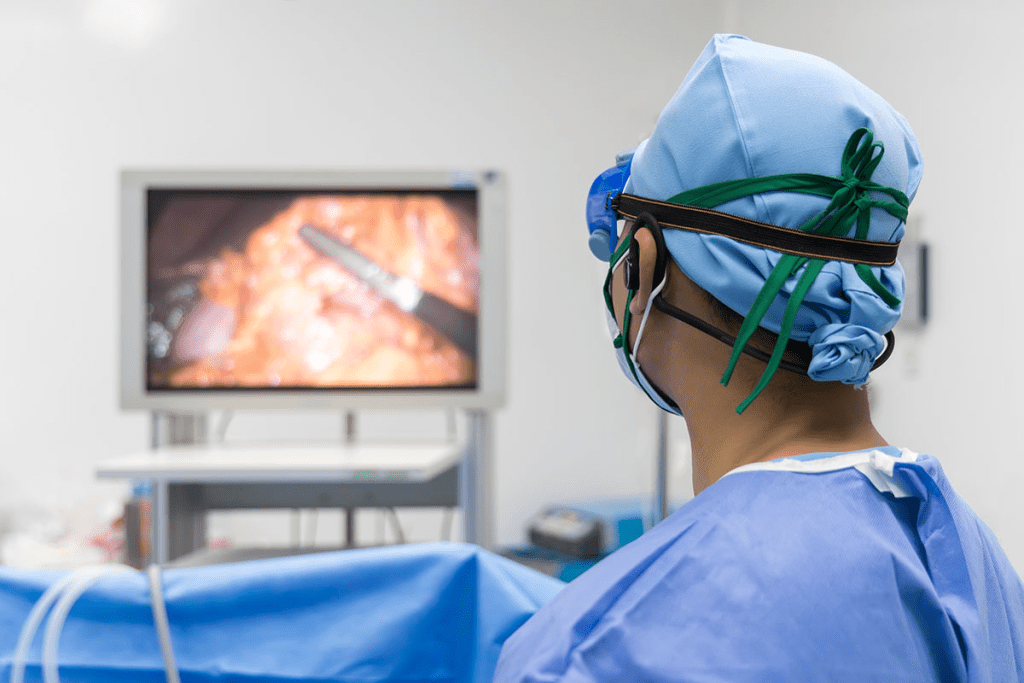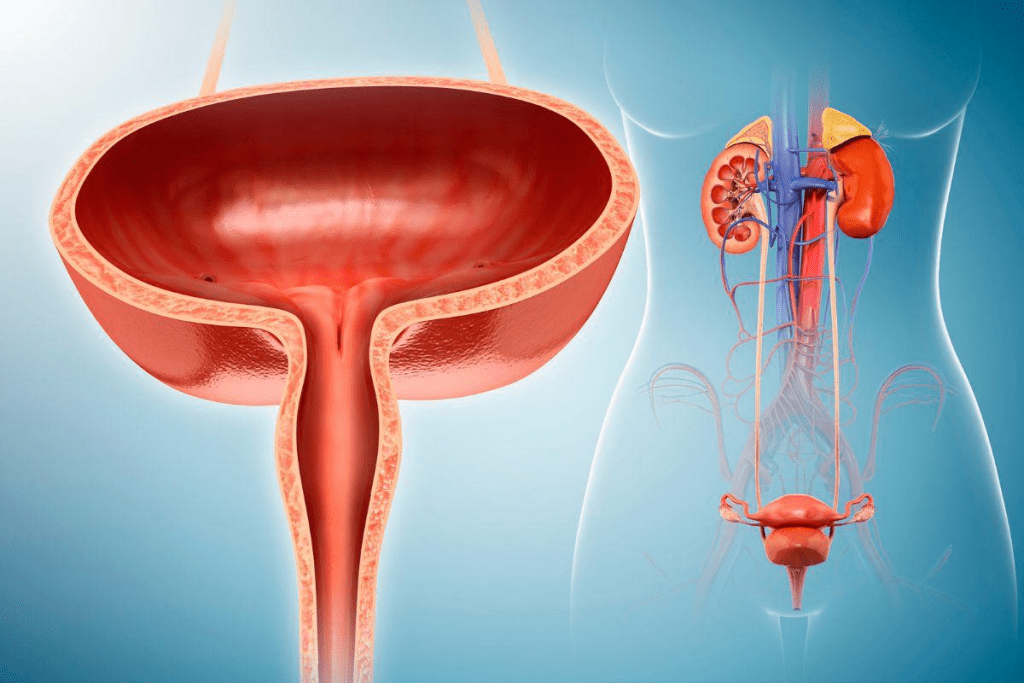Last Updated on October 31, 2025 by

Bladder surgery is a complex field that needs specialized care. Urologists are the main doctors who deal with urinary tract issues, including procedures like suprapubic catheterization, which helps manage bladder function. We will look at the surgeons who perform bladder surgery and their specializations. Urologists are trained to do procedures like TURBT (Transurethral Resection of Bladder Tumor), a key surgery for treating bladder tumors. At places like Liv Hospital, urologists work with other doctors to ensure the best care. Their knowledge is essential in managing bladder surgery and providing comprehensive care for patients.
Urologists are key in bladder surgery, thanks to their specialized training. They play a big role in managing complex urinary tract issues. Their deep understanding of the urinary system is essential for these surgeries.

Urologists get extensive training for urinary tract surgeries. They learn to handle bladder injuries, tumors, and other disorders. They are skilled in complex surgeries like radical reconstruction and ileal conduit urinary diversion.
Urologists get a broad training that includes surgery and non-surgical treatments. They can handle many procedures, from simple to complex surgeries. They also manage medical conditions related to the urinary system.
Statistics show urologists lead in bladder surgery. For example, they handled 59.8% of open bladder repairs in complex cases. Their skills in surgeries like radical reconstruction and ileal conduit urinary diversion are well-known.
Urologists are not just involved in specific surgeries. They play a key role in all urinary tract surgical care. Their leadership in this field shows their specialized training and expertise.
General surgeons are key in bladder operations, mainly in emergencies. While urologists handle most bladder surgeries, general surgeons step in for urgent cases. Their wide training lets them manage complex injuries, including bladder ones.
Statistics show that general surgeons do 40.2% of bladder repair surgeries, mostly in urgent cases. This highlights their role in bladder injury management, where quick action is needed.
General surgeons do bladder surgery in emergencies, like trauma. Their skills are essential for quick fixes to bladder injuries. They are good at resecting or fixing damaged tissue.
Choosing a general surgeon depends on the injury’s severity and type. For simpler cases, urologists might lead. But for complex or urgent cases, general surgeons take charge.
General surgeons’ comfort with bladder injury grades varies. They’re okay with minor injuries but might need help with complex ones. Urologists are often better suited for these.
Experience with similar cases affects a general surgeon’s comfort. Those with more experience handle a broader range of injuries. They might use tacking, a suturing method, based on the case.
In summary, general surgeons are critical in bladder operations, mainly in emergencies. They work with urologists and others to give full care to patients with bladder issues.
Bladder surgeries are complex and varied. They treat many conditions, like cancer and severe injuries. Skilled urologists perform these surgeries.
Urologists are experts in these surgeries. They have a lot of education and training in urological surgery.
Radical reconstruction surgeries rebuild or replace parts of the bladder. They are needed for bladder cancer or severe damage.
Key aspects of radical reconstruction include:
Urologists with a focus on reconstructive surgery are skilled in these procedures. They aim for the best results for patients.
The Transurethral Resection of Bladder Tumor (TURBT) procedure is used to diagnose and treat bladder tumors. It removes the tumor from the bladder wall.
Specialists qualified to perform TURBT include:
The TURBT procedure needs precision and skill. It’s important to have a qualified urologist do the surgery.
Ileal conduit urinary diversion creates a new pathway for urine when the bladder is removed or bypassed. It’s often done with radical cystectomy for bladder cancer.
Specialists who perform ileal conduit urinary diversion include:
These specialists have the training and experience needed for successful ileal conduit urinary diversion.
Suprapubic catheterization is a method where a catheter is inserted through the abdomen. It’s used when other catheter methods don’t work. This procedure requires a lot of skill and knowledge.

This method is chosen when patients can’t urinate normally or have urinary retention. Urologists are key in this process. They know a lot about the urinary system.
There are several reasons why a suprapubic catheter might be needed:
A suprapubic catheter is a good solution for these issues. It’s often used for long-term needs.
Urologists are the main doctors for suprapubic catheterization. They are trained to handle urinary problems.
Other surgeons might also do this procedure. But, urologists are usually the best choice because of their expertise.
Before getting a suprapubic catheter, talk to a healthcare expert. They will check if it’s right for you. They make sure it’s done safely and correctly.
Managing complex bladder surgeries requires a team effort. We know that these cases need a mix of skills from different surgeons working together.
The role of multidisciplinary teams in bladder surgery is huge. Urologists, general surgeons, and others join forces to give each patient the care they need.
When dealing with complex bladder issues, teamwork is key. Urologists focus on urinary tract problems, while general surgeons handle surgical techniques and patient care. This team tackles tough cases together.
This team effort leads to better patient results, shorter recovery times, and happier patients. It helps avoid complications and ensures top-notch care for everyone.
A study looked at 472 joint operations. It showed how teamwork in surgery works. Multidisciplinary teams got better results than solo surgeons in complex bladder surgeries.
This study highlights the value of collaborative surgical approaches in complex bladder cases. Teamwork leads to better patient care and success in surgery.
Surgical procedures, like abdominal surgery, can sometimes lead to bladder injuries. These injuries are a common but unfortunate complication of many surgeries.
Bladder injuries during abdominal surgery are a known risk. Research shows that these injuries can happen more often in surgeries that deeply dissect the pelvis. “The incidence of bladder injuries during abdominal surgery highlights the need for surgeons to be vigilant and prepared for such complications,” experts say.
“The key to managing bladder injuries lies in early recognition and appropriate surgical intervention.”
Expert Opinion
Urologists are key in managing these injuries. They have the specialized knowledge needed to handle the urinary tract. Their help is essential for a proper assessment and treatment of the injury.
The severity of the bladder injury determines the level of specialist involvement. Minor injuries might be handled by the primary surgical team. But, more severe injuries need a urologist’s expertise. In complex cases, a team of specialists, including urologists and other surgeons, works together.
Managing bladder injuries during other surgeries is a complex task that needs a team effort. It involves the surgical team and other healthcare professionals who are vital for the patient’s recovery.
Understanding bladder injury prevalence and the role of specialists can improve patient outcomes. Effective management of bladder injuries during surgeries is key to reducing complications and ensuring the best recovery for patients.
Choosing the right surgeon for your bladder procedure is key. It affects the success of your surgery and how well you recover. Your surgeon’s expertise and experience play a big role.
There are important factors to consider when making your choice. We’ll help you find the right surgeon for your needs.
It’s important to ask the right questions before deciding. Here are some questions to ask your surgeon:
These questions will help you understand your surgeon’s expertise. For more info on bladder surgery, check out NCBI’s guide on bladder injuries.
When looking at surgeons, their credentials and experience are critical. Look for surgeons who are:
A surgeon with the right credentials and experience can greatly improve your chances of a good outcome. It’s also important to see how well they communicate and address your concerns.
The recovery process can differ based on the surgeon’s skill and method. A skilled surgeon can make sure your procedure goes well and help you recover smoothly.
Several factors affect your recovery, including:
Choosing a surgeon with a good track record can help you recover better and avoid complications. Remember, talk about your recovery expectations during your pre-surgery consultation.
Choosing the right specialist is key for good bladder surgery results. We talked about how urologists and other experts play big roles. They have the right training and skills for these surgeries.
The specialist you pick can really affect your surgery’s success. Urologists, with their special training, often lead in bladder surgeries. This includes complex jobs like radical reconstruction and TURBT.
Knowing what specialists do helps patients make better choices. We suggest asking surgeons about their background, experience, and what to expect after surgery. This way, patients can get the best care.
In the end, picking the right specialist is vital for great surgery results. We stress the need to choose a skilled urologist or specialist. This ensures a good surgery and the best outcome.
Urologists are the main doctors for bladder surgery. They know a lot about the urinary tract.
General surgeons help in emergency cases, like injuries. They are key in treating bladder injuries.
TURBT is a way to find and treat bladder tumors. Urologists do this procedure.
Ileal conduit urinary diversion makes a new way for urine to leave the body. Urologists are trained for this.
Suprapubic catheterization uses a catheter through the belly to drain urine. Urologists usually do this.
Look at their credentials and experience. Ask about their approach to your condition and the procedure.
A team of urologists, general surgeons, and others offers complete care. This leads to better results for complex cases.
Eating well and doing physical therapy can help. Talk to your urologist for advice.
Recovery depends on the surgery and the surgeon. Always follow the surgeon’s instructions for a smooth recovery.
Plastic surgery can have risks, like complications. Choosing a skilled surgeon can lower these risks.
Radical reconstruction is a complex surgery for the bladder. It’s needed after big injuries or diseases. Urologists do this.
A female catheter drains urine from the bladder in women. It’s used in medical situations, like after surgery.
‘Tacking’ in surgery means securing tissues or materials. It’s used in bladder surgeries and other procedures.
Check their credentials, like board certification in urology. Also, ask about their experience with your procedure.
Stitch Fix is a clothing service. It’s not related to bladder surgery. But wearing comfortable clothes is good for health and recovery
Subscribe to our e-newsletter to stay informed about the latest innovations in the world of health and exclusive offers!